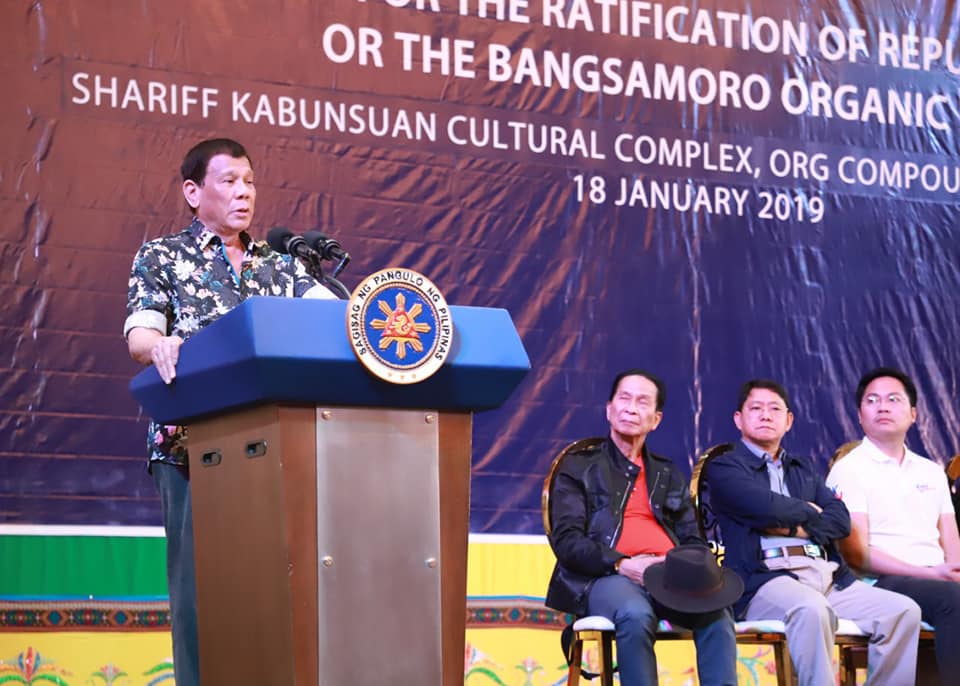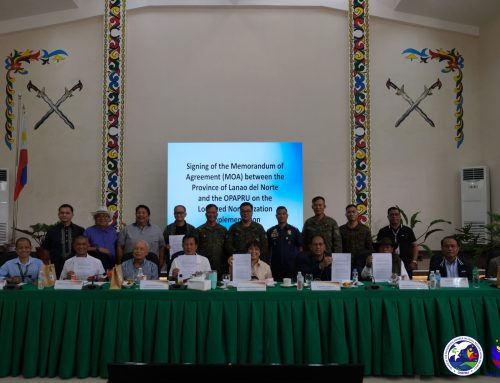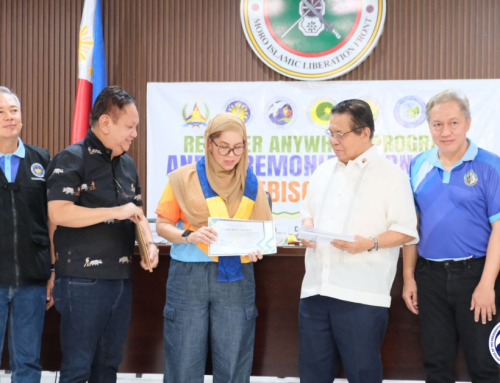SHARIFF KABUNSUAN COMPLEX, COTABATO CITY (January 19, 2019) — President Rodrigo Duterte joined thousands of Moro and non-Moro residents here on Friday in a grand peace assembly to make a final pitch for the ratification of the Bangsamoro Organic Law (BOL).
“The fact we have reached this point after so many years of negotiations and interruptions, we are here,” the President said in his keynote address, referring to the decades-long peace process between the Philippine Government and the Moro Islamic Liberation Front (MILF).
“Let us forget the bitterness of the past and look forward to the future. Which means ladies and gentlemen, mga mahal kong mga Moro brother or sister, magboto kayo ng Yes,” Duterte said.
“Your approval of this law will not only serve as an expression of your desire to end more than half-a-century of armed struggle in the region, it will also serve as a testament to your determination to bring peace,” he added.
Honoring all signed peace agreements
“This landmark law was not built entirely from scratch. It echoes the aspirations and principles embodied in the past peace agreements [with] the different Moro fronts,” Duterte said, who was also accompanied by his top peace and security cabinet officials during his visit to this city.
Among the cabinet officials who joined the President were Defense Secretary Delfin Lorenzana, National Security Adviser Hermogenes Esperon Jr., Interior Secretary Eduardo Año, Presidential Peace Adviser Carlito Galvez Jr., Cabinet Secretary Karlo Nograles, Deputy Presidential Peace Adviser Nabil Tan, Department of Social Welfare and Development Secretary Rolando Bautista and Presidential Spokesperson Salvador Panelo.
“Indeed, it is a product of blood, sweat and tears of many great men who came before us,” Duterte said.
The President, who hails from Mindanao, had pledged even before his assumption into office to address the historical injustices committed against the Bangsamoro people.
This commitment resulted in the crafting of the Duterte Administration’s Peace and Development Agenda wherein all signed peace agreements with the various Moro fronts will be honored and implemented.
These include the Final Peace Agreement (FPA) signed between the Philippine Government and the Moro National Liberation Front (MNLF) in 1996 and the Comprehensive Agreement on the Bangsamoro (CAB) forged between the national government and the MILF in 2014.
The BOL, which was signed into law by the Duterte in July 2018, is considered a groundbreaking measure as it represents the hopes and aspirations of the Moro people and is anticipated to provide a genuine solution to the decades-long armed conflict in Mindanao.
An inclusive law
According to the President, the law is anchored on the principle of inclusivity, being a product of a comprehensive consultation process among the tri-people of Mindanao.
“We listened to the indispensable sentiments and concerns of Muslims, Christians, Lumads, and other indigenous people and various stakeholders who also call Mindanao their own,” Duterte said.
He likewise highlighted the major benefits of the BOL, while expressing confidence it will be able to respond to the pressing issues being confronted by the proposed Bangsamoro region.
“I am proud to say the BOL has undergone comprehensive analysis and thorough review to ensure that once implemented, it will lead to better governance, inclusive political empowerment, and enhanced systems of transparency and accountability,” Duterte said.
“Your approval of this law will not only serve as an expression of your desire to end more than half-a-century of armed struggle in the region, it will also serve as a testament to your determination to bring peace,” he added.
In conclusion, the President called on the Moro people to support the BOL and vote for its ratification.
“To my dear Bangsamoro brothers and sisters, as you exercise your sacred right to vote in this plebiscite, I remind you that the power to chart the course of your future is now solely in your hands,” Duterte said.
Rallying the support of the people
For his part, MILF Chairman Ebrahim Murad admitted that the concerns his organization are now facing seem greater than the ones they encountered as revolutionaries.
“The challenges ahead are much greater than what we have surpassed in the past. It is not an easy job to transform from [being] a revolutionary to [people in] governance,” Murad said.
The top MILF leader, however, said he was confident his group will be able to overcome these challenges with the support of the Moro and non-Moro people.
“Our success lies on how we are going to mobilize our people and the other people in the area,” he said.
Murad expressed his appreciation to local government units as well as Christian settlers across the region who have thrown their support behind the law.
“To the LGUs who have shown their overwhelming support, we offer our commitment to work with you. To our brothers and sisters in the Christian faith, we offer you the hand of peace,” he said.
“So that together, we can bring development and progress to every corner of this region,” he added.
Murad thanked the President for the unequivocal support he has given to BOL, specifically for the strong push he made to ensure the law’s passage in Congress.
“You are always [by] our side. If you did not become president, we will not have a BOL,” he said.
Not an ordinary law
At the same event, MNLF Central Committee Chairman Yusoph Jikiri said the BOL will have a great impact on the lives of the Moro people.
“This is no ordinary law. This is the product of 50 long years of struggle,” Jikiri said.
He noted that the BOL is a convergence of all the peace agreements between the Philippine Government and the various Moro fronts.
Jikiri recalled a tripartite meeting organized by the Organization of Islamic Conference (OIC) years ago which called on the Philippine Government and the MNLF to review and preserve the gains of the 1996 Final Peace Agreement.
During the meeting, he said the OIC recommended that the MNLF and MILF come up with a “common mechanism” that would enable both groups to work harmoniously.
The tripartite meeting, Jikiri said, helped bridge the gap between the two rebel groups which eventually resulted to the strong partnership in pushing for the BOL’s passage and ratification.
“The BOL is better than the ARMM Organic Law in terms of resources. We should not miss this opportunity for progress,” he said.
Bound by history
In the meantime, ARMM Governor Mujiv Hataman said the Moro people are bound by their history.
Hataman said that when the region’s people cast their vote on January 21 and February 6, they will be writing another chapter in their history.
He pointed out that the conduct of the plebiscite is a testament to the success of the peace process and sends a strong message to all that the armed conflict in the area is finally over.
“In our journey [for peace], let us not forget that our success is anchored in our unity. We have been together in our struggle. We will be united in our victory,” Hataman said.












